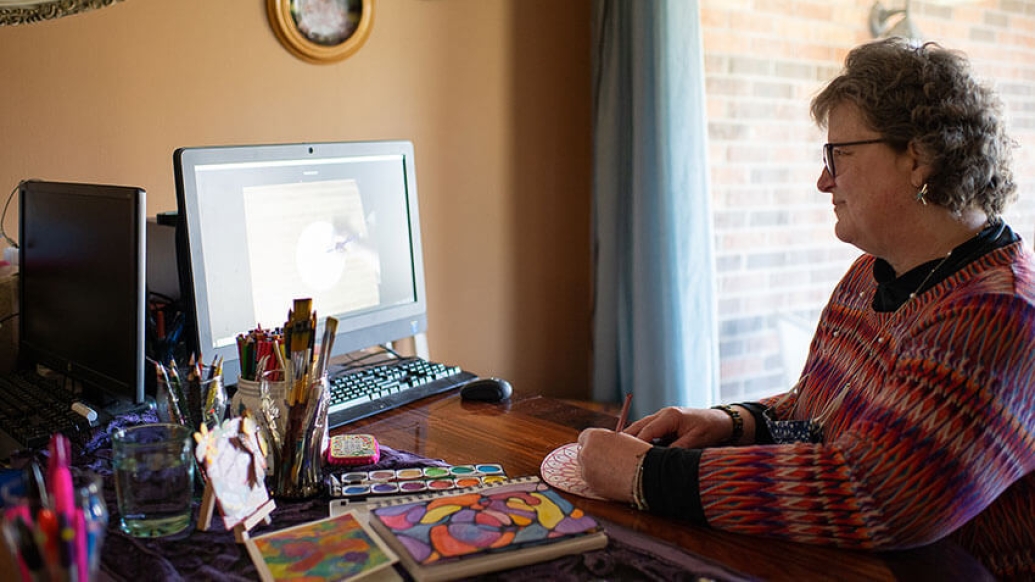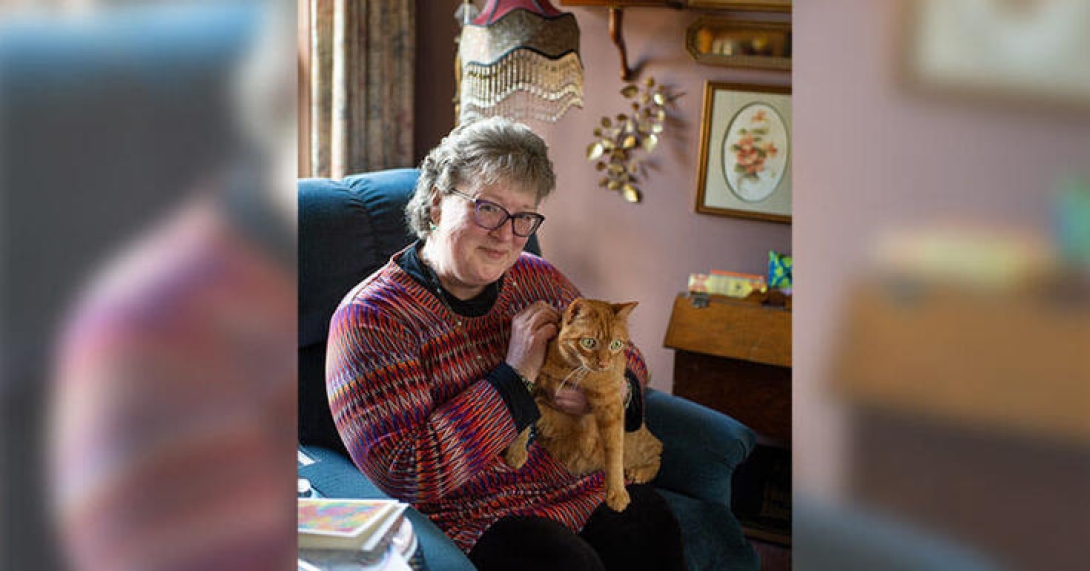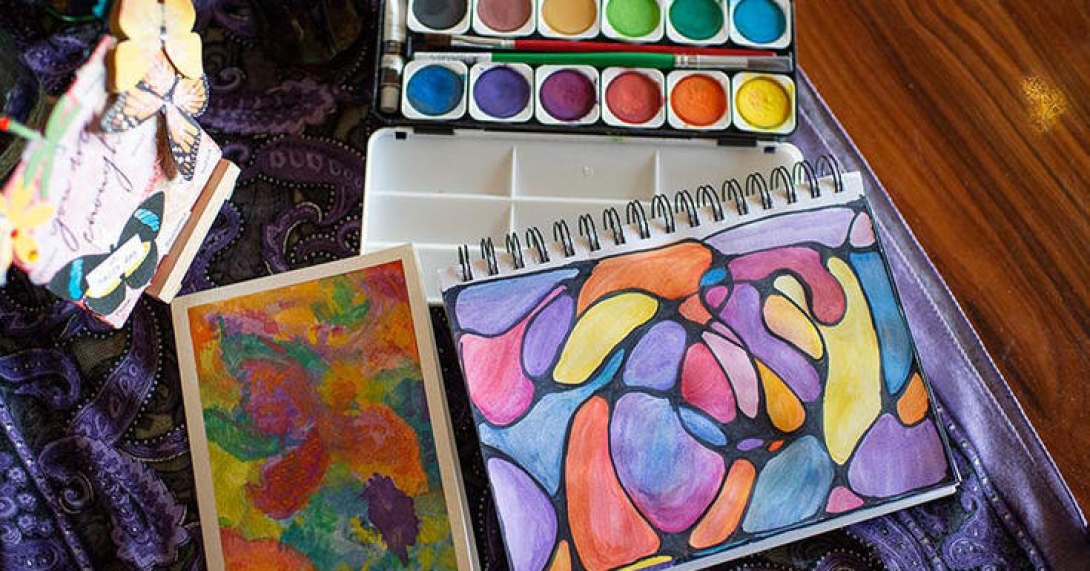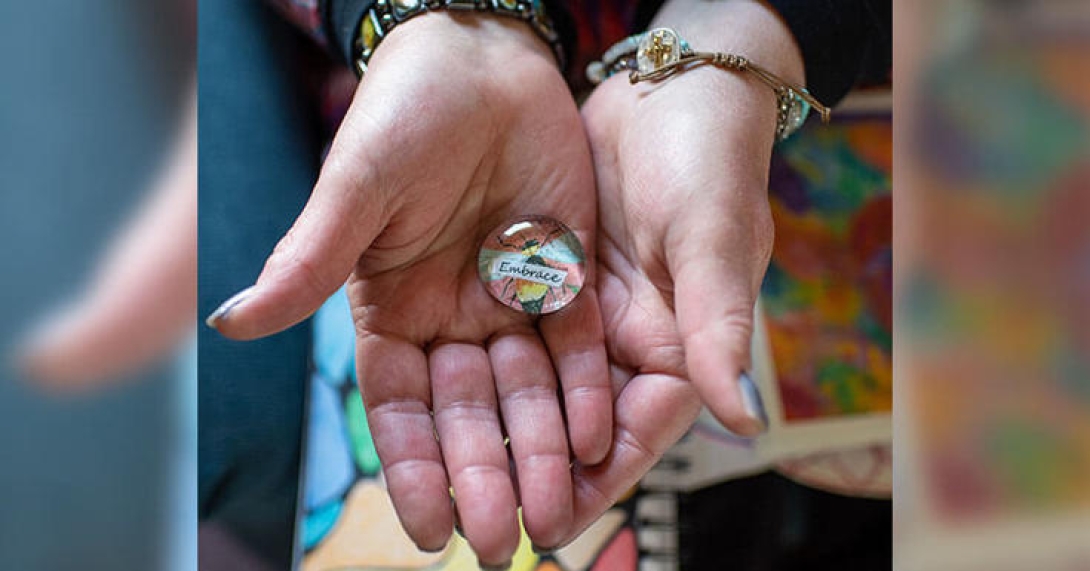One patient transcends her ‘moat’ against COVID-19 while her art therapist finds unexpected benefits to teaching online.
5:00 AM
Author |

Theresa Gougeon was angry, furious even.
In the past 18 months, she'd dealt with an antibiotic-resistant superbug (twice) and treatment for ovarian cancer — plus the suffocating fear that involves leaving your house when you're immunocompromised during a pandemic.
She was exhausted from being in "fight-flight-freeze mode," she told Sandra Drabant, an art therapist at the University of Michigan Rogel Cancer Center.
"Think about a color that would fit with that feeling," said Drabant from Gourgeon's computer screen. "Think about some marks. Think about some lines. Take a few minutes and just express that."
So that's what Gougeon did, scribbling in the sketchbook on her dining room table, releasing her frustration through jagged lines that shot from her pen. Drabant watched, remotely. Technically, she and Gougeon were separated by many miles and the heightened risk from COVID-19 for people with cancer. But a click of a button brought Drabant into Gougeon's home, where she was needed most.
"To be sitting in my own castle, with the moat outside," Gougeon says, "nobody could get in or out. But I could see her."
MORE FROM MICHIGAN: Sign up for our weekly newsletter
When Gougeon was done, she lifted the paper up to her webcam to show Drabant, and they talked about different elements of her drawing and the feelings each portion evoked. When they hung up after the hour-long Zoom, Gougeon was smiling again.
"I call her my art doctor," Gougeon says, "because she's the doctor who gives me the medicine that takes me into a comfortable place — who brings me into the light."
In some ways, the work I'm doing on Zoom has allowed patients to be more emotionally supported.Sandra Drabant, Art Therapist
Art therapy goes virtual
Last year, as COVID-19 became a more serious threat, the cancer center's patient and family support services staff realized they needed to pivot. They could no longer hold their support groups or individual therapy sessions in person. So, why not take them online?
Except, could art therapy really be done virtually?
Drabant typically relies on watching the body language of her patients as they paint or sketch or molded clay into figures, so she can ask appropriate questions and guide them in the right direction. She could only do so much of that on Zoom. Plus, there was the logistical question of how to get patients the art supplies they needed to express their sadness or their fear, their turmoil and moments of grace.
Like Podcasts? Add the Michigan Medicine News Break on iTunes or anywhere you listen to podcasts.
But Drabant was determined to keep seeing as many patients as she could.
"There would be a massive pool of people who wouldn't be able to access this service if we didn't offer it," Drabant says. "I put my hand up and said, 'I will figure out a way to make this work.'"
So she compiled art kits — plastic bags full of watercolors, oil pastels, collage materials, markers, and more — that patients could pick up the next time they came to the cancer center.



SEE ALSO: Complementary Cancer Therapies: Can They Really Help?
On Zoom, the camera angles were tricky to figure out, but the benefit of virtual art therapy was easily apparent. Not only did patients like Gougeon feel more protected from the coronavirus, many were also more comfortable sharing personal details in the privacy of their own homes.
"They talk about all kinds of things that feel a little more sensitive to discuss when there's another patient sitting two feet away from you in an infusion area," Drabant says. "In some ways, the work I'm doing on Zoom has allowed patients to be more emotionally supported."
Plus, the verbal coaching Drabant has done more of over Zoom nudges patients to verbalize their thoughts while making art.
"It's actually helped them understand it more," Drabant says.
A silver lining: The format has been so successful that Drabant plans on keeping virtual art therapy available as an option once the pandemic is over, at least for those who aren't staying in the hospital.
Making 'a beautiful ride'
Gougeon, 60, has created labyrinth drawings, where she draws a circle with a line inside that leads to the center and then slows her breathing while retracing the winding path. She's made Zentangles, mesmerizing sketches made up of patterns that repeat basic strokes like lines, dots, and curves. She's crafted what she calls memory stones, which resemble miniature paperweights. Her favorite is one with a piece of paper inside that reads, "Embrace," with a bumblebee peeking out from under the mantra.
SEE ALSO: Pancreatic Cancer Patient Faces the Future with Humor, Love and Art
"The memory stone helps me remember to, when I see something that works for me, embrace it," Gougeon says. "If it doesn't, I let it be."
She keeps her artworks in an accordion file in her dining room or on the table where she sits during art therapy sessions. That way, she can access them easily if she needs to calm herself down. When she goes to the doctor, Gougeon takes her sketchbook or uses a memo app on her phone to doodle a shell shape that reduces her anxiety.
They're all tools she uses to focus, to go to her happy place, to get back in touch with the Theresa she was before cancer arrived.
She gives the analogy of roller coasters, which she loves.
"I can't get off this cart," Gougeon says, "but I can make it a beautiful ride."
For perspectives from cancer survivors, practical advice on living with cancer and expertise from our leading care professionals, sign up for the Rogel Cancer Center's Thrive newsletter.

Explore a variety of health care news & stories by visiting the Health Lab home page for more articles.

Department of Communication at Michigan Medicine
Want top health & research news weekly? Sign up for Health Lab’s newsletters today!





